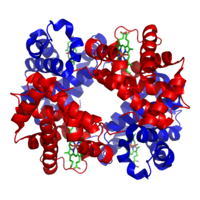
Photo from wikipedia
We investigated the effect of tofogliflozin, a sodium-dependent glucose cotransporter 2 inhibitor (SGLT2i), on retinal blood flow dysregulation, neural retinal dysfunction, and the impaired neurovascular coupling in type 2 diabetic… Click to show full abstract
We investigated the effect of tofogliflozin, a sodium-dependent glucose cotransporter 2 inhibitor (SGLT2i), on retinal blood flow dysregulation, neural retinal dysfunction, and the impaired neurovascular coupling in type 2 diabetic mice. Tofogliflozin was added to mouse chow to deliver 5 mg/kg/day and 6-week-old mice were fed for 8 weeks. The longitudinal changes in the retinal neuronal function and blood flow responses to systemic hyperoxia and flicker stimulation were evaluated every 2 weeks in diabetic db/db mice that received tofogliflozin (n =6) or placebo (n = 6) from 8 to 14 weeks of age. We also evaluated glial activation and vascular endothelial growth factor (VEGF) expression by immunofluorescence. Tofogliflozin treatment caused a sustained decrease in blood glucose in db/db mice from 8 weeks of the treatment. In tofogliflozin-treated db/db mice, both responses improved from 8 to 14 weeks of age, compared with vehicle-treated diabetic mice. Subsequently, the electroretinography implicit time for the oscillatory potential was significantly improved in SGLT2i-treated db/db mice. The systemic tofogliflozin treatment prevented the activation of glial fibrillary acidic protein and VEGF protein expression, as detected by immunofluorescence. Our results suggest that glycemic control with tofogliflozin significantly improved the impaired retinal neurovascular coupling in type 2 diabetic mice with the inhibition of retinal glial activation.
Journal Title: International Journal of Molecular Sciences
Year Published: 2022
Link to full text (if available)
Share on Social Media: Sign Up to like & get
recommendations!